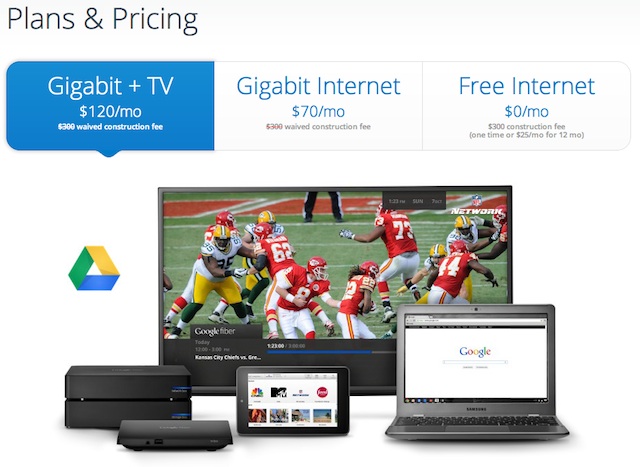
On Wednesday, Republican FCC commissioner Ajit Pai released a statement praising the Google Fiber project as a model for other metropolitan areas to follow. He argued that it shows that "it is critically important that states and local communities adopt broadband-friendly policies when it comes to rights-of-way management."
Fred Campbell, a former FCC official who now hangs his hat at the Competitive Enterprise Institute, has been singing a similar tune in recent weeks. He portrays the Google Fiber project in Kansas City as a triumph for free markets, once government gets out of the way. "Deregulation promotes private investment," he writes in a recent analysis of the broadband network. He regards the Google project's apparent success as a rebuke to groups like Public Knowledge and Free Press, which advocate a more active government role in developing and regulating broadband networks.
Yet closer examination of the Google Fiber project reveals a more complex story. It's true that the Google Fiber project hasn't developed the way many liberal groups wanted it to. But it's important not to gloss over the fact that Kansas City's support for Google's network went well beyond deregulation to outright corporate welfare. It's hardly an example of the free market in action.
A level playing field?
"When private companies compete on a level playing field, consumers always win," Campbell writes. "When government regulations mandate a particular business model or favor a particular competitor, bureaucracy is the only winner—everyone else loses."
Few would disagree with this in the abstract. But is Google Fiber an example of a level playing field or government favoritism? Campbell seems to believe the former, but his own description of the project suggests the opposite interpretation:
Google received stunning regulatory concessions and incentives from local governments, including free access to virtually everything the city owns or controls: rights of way, central office space, power, interconnections with anchor institutions, marketing and direct mail, and office space for Google employees. City officials also expedited the permitting process and assigned staff specifically to help Google. One county even offered to allow Google to hang its wires on parts of utility poles—for free—that are usually off-limits to communications companies.
Indeed, the agreement between Google and Kansas City, MO, specifies that the city will "make space available to Google in City facilities for the installation of Google’s Central Office equipment and for additional network facilities," will "provide power necessary for Google’s equipment at City locations," and "will not charge Google for such space, power, or related services."
Obviously, offering free (e.g. taxpayer-subsidized) power and rack space goes well beyond "regulatory concessions." Campbell has suggested that these subsidies "weren't as important as the rights of way issues," but much the same point can be made about waiving customary fees for the use of rights of way. Space under a city's streets and along its utility poles is a scarce, taxpayer-owned resource. When a city offers a private company access to those resources for free, it's forgoing an opportunity to raise revenue. The implicit subsidy is even clearer when taxpayers, rather than Google, pay to hire extra city staff to supervise the project.
"There's a reason we have these fees for rights of way," said Mercatus Center scholar Jerry Brito when interviewing Campbell for his podcast. "It's incredibly costly for the community to put up with having the streets torn up every time there's a new entrant." Brito argued that fees were needed to "internalize the costs of what they're imposing on the community" and "to pay for the city to supervise it to make sure that is all done correctly."
Campbell conceded that "you don't want just any company to be able to come in and tear up the streets without some assurance that they'll repair the damage." That's true enough, but the issue goes deeper than that. Even assuming Google leaves the streets exactly as it found them, the company will still be getting free access to valuable taxpayer-owned resources. And it will still impose significant costs—in terms of noise, construction damage, congestion, and so forth—on thousands of Kansas City residents. Waiving fees designed to compensate the community for those costs represents an implicit subsidy to Google.
Telling the truth about subsidies
As depressing as it is to contemplate, we should acknowledge the possibility that it simply doesn't make economic sense for private firms to build new fiber networks without taxpayer subsidies. This is especially likely for new entrants, like Google, who would be building networks from scratch in towns that already have a couple of incumbent players.
If it's true that more robust wired broadband competition won't occur without public support, reasonable people can disagree about the policy implications. Conservatives might argue that we should make do with the limited options we already have, perhaps waiting for advances in wireless technology to provide new alternatives down the road. Liberals might counter that the public benefits of faster broadband networks make them worthy of public subsidies—or they might argue that the government should mandate more open-access rules on existing networks rather than subsidizing new ones.
If a city is going to spend public funds on a new broadband network, it has an obligation to ensure that taxpayers are getting a good deal for their money. That might mean insisting on conditions, such as build-out requirements or open-access rules, that will avoid the need for yet another taxpayer-subsidized network to be constructed in the future. But mis-characterizing a government-supported project as the result of unfettered free markets obscures the true costs of such projects, and makes informed debates over them more difficult.
reader comments
230